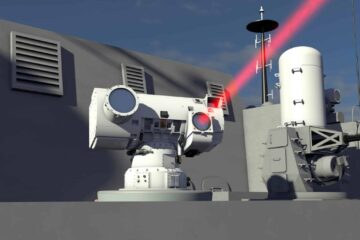A total of eight Banshee air vehicles were purchased from QinetiQ last year under Project Vampire Phase 1. Part of a broader Future Maritime Aviation Force vision, Project Vampire is seeking to explore the utility of a small, low-cost fixed-wing uncrewed air vehicle across a number of different use cases including threat simulation, electronic warfare, and intelligence, surveillance and reconnaissance.
Originally designed as a target for weapon system testing and air defence exercises, the Banshee Jet80+ is a composite delta wing monoplane with two rear-mounted JetCat P400+ engines producing 870 N total thrust. Launched using a pneumatic catapult system, the air vehicle is controlled using the Merlin ground control system, and deploys a parachute at the end of its sortie to recover to land or sea.
According to performance parameters released by QinetiQ, the Banshee Jet80+ is capable of a speed of just under 400 kt, manoeuvres of up to 6 g sustained, and a mission endurance approaching one hour. An internal bay provides the ability to carry up to 25 kg of payload.

QinetiQ undertook a pilot trial of the Banshee Jet80+ from the aircraft carrier HMS Prince Of Wales in September 2021. This proof of concept, conducted on the MoD Hebrides range off the west coast of Scotland during Exercise Joint Warrior 21, involved two sorties: in the first, a single Banshee Jet80+ flew multiple ‘attack’ profiles against the ship as a representative Red Air threat; in the second, two Banshee Jet80+ aircraft were launched in sequence to demonstrate multiple vehicles operating simultaneously.
A Banshee Flight was established at Royal Naval Air Station Culdrose earlier this year under the parentage of 700X Naval Air Squadron. 700X is the RN’s specialist unit for uncrewed aviation.
The RN is currently working to finalise the safety case for the Banshee Jet80+ ahead of beginning flying operations from Predannack in the coming months. “Safety is absolutely key for us,” Lieutenant Tony Nairn, Banshee Flight commander, told Naval News. “No one in the Royal Navy has previously flown a jet-powered uncrewed air system yet, so this is a massive leap”.
“What we intend is that we will progressively develop the scale and complexity of the trials, and we will also be looking at different payloads,” he added. “Technology is advancing so fast that it is very difficult right now to specify what comes next in Vampire Phase 2, so it is important than we learn lessons in Phase 1 to inform where we go.”






